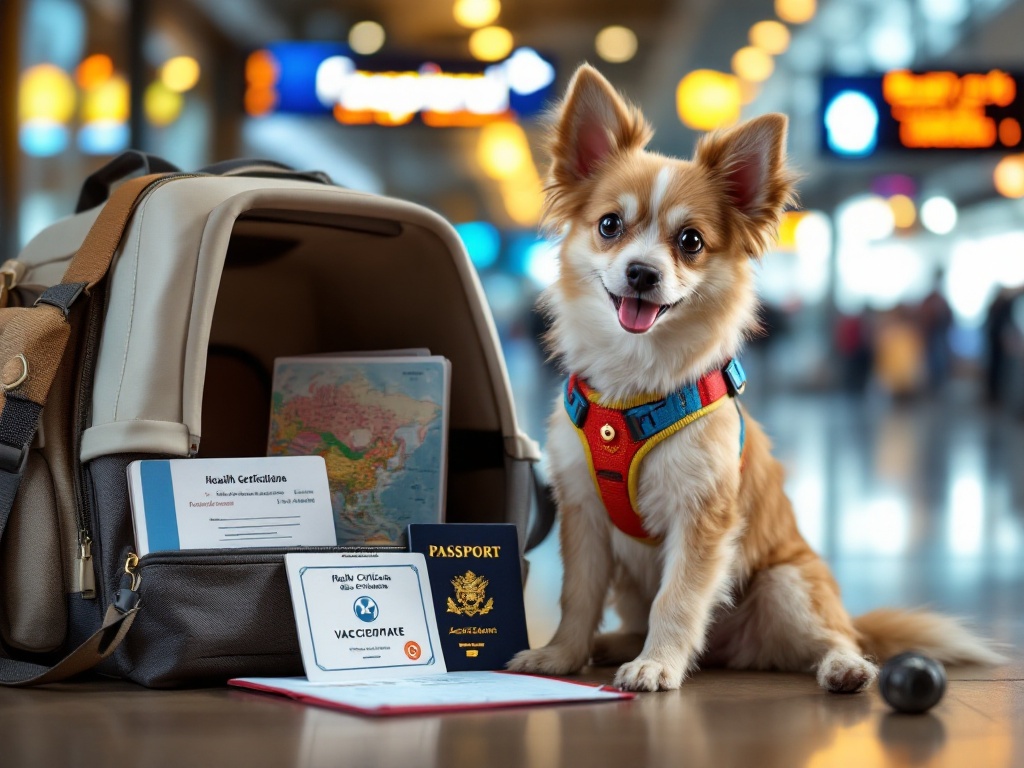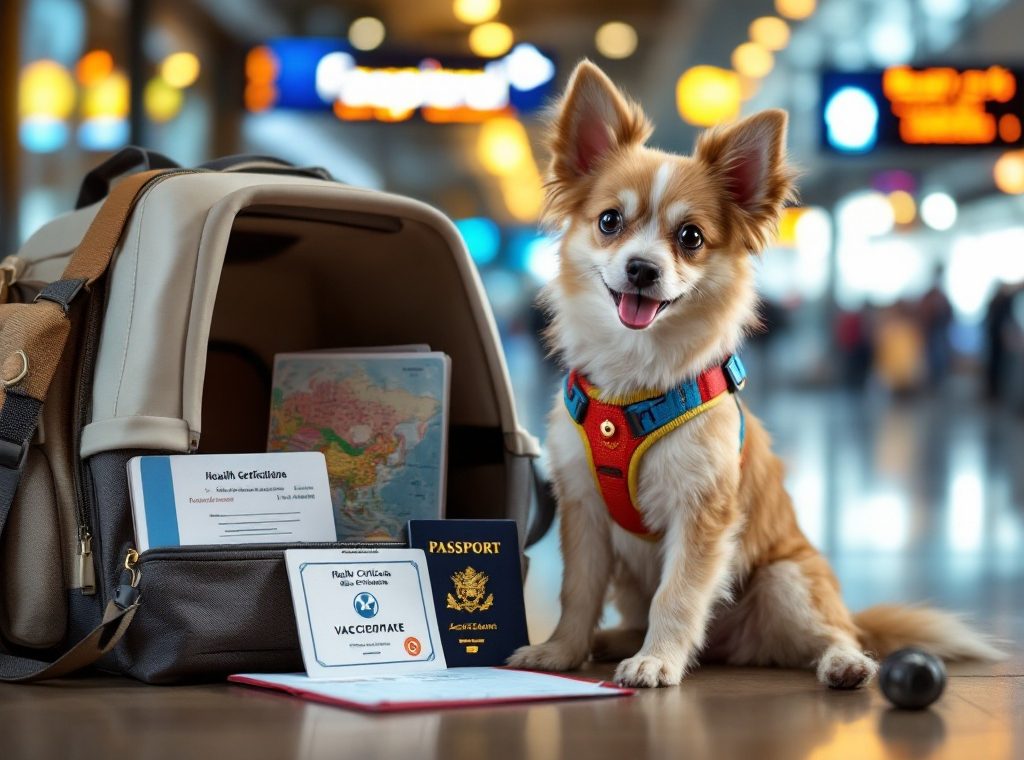Pet Vaccination Requirements for International Travel
Planning international travel with your pet? Ensure a smooth trip by understanding crucial vaccination and documentation requirements. Rabies vaccination is mandatory, often needing completion at least 21 days before travel, and additional vaccinations or tests like a rabies titer test might be necessary depending on your destination. Secure a health certificate from a USDA-accredited veterinarian within 10 days of your departure. Don’t risk delays; learn more about preparing your furry friend for a hassle-free journey.
Important information

- Rabies vaccination is generally required; proof is often needed at least 21 days before travel.
- Check your destination’s specific requirements for other vaccinations (like distemper or parvo) and parasite treatments early in your planning.
- Essential documents include a vaccination certificate, a health certificate from a USDA-accredited veterinarian (valid for 10 days before departure), and possibly a pet passport or rabies titer test (especially for EU travel).
- Quarantine rules vary significantly by country; research your destination’s requirements and airline pet policies in advance.
- Consult your veterinarian to ensure your pet’s vaccinations are up-to-date and to obtain the necessary health certificates and advice.
Pet Vaccination Requirements for International Travel
Traveling internationally with your pet requires careful planning, especially regarding vaccinations. Rabies vaccination is almost universally required, with proof often needed at least 21 days before travel. Some countries may also require vaccinations for diseases like distemper or parvovirus. Check your destination’s specific requirements early. Essential documents include a vaccination certificate with dates, vaccine types, and veterinarian information, and a health certificate from your vet. Some countries may also require a pet passport or a rabies titer test. Planning ahead ensures a smooth trip with your furry friend.
Research your destination’s pet import regulations. This includes vaccination requirements, quarantine rules, and any necessary documentation.
Ensure your pet’s rabies vaccination is up-to-date. Most countries require proof of rabies vaccination at least 21 days before entry.
Consult your veterinarian. They can advise on any additional vaccinations or health checks required for your destination.
Gather necessary documents. This typically includes a vaccination certificate, a health certificate from your vet, and possibly a pet passport or rabies titer test results.
Confirm import regulations with the destination country’s embassy or consulate. This ensures you have the most up-to-date information.
Understanding Destination Country Requirements
Traveling internationally with your pet involves careful preparation, especially concerning their health. Every country has specific regulations, often including vaccinations and parasite treatments. For a hassle-free arrival, research these requirements early in your planning. Consult your veterinarian to ensure your pet’s vaccinations are up-to-date and to obtain the required health certificates. Addressing these details well in advance will prevent potential travel disruptions. Here’s a step-by-step guide to help you prepare:
Research destination country regulations. Each country has specific requirements for pet entry, often involving vaccinations, parasite treatments, and health certificates. Start your research early to avoid last-minute surprises.
Consult your veterinarian. Your veterinarian can confirm your pet’s vaccinations are current and administer any necessary boosters or parasite treatments. They can also provide the required health certificates and advise on any specific health concerns related to your destination.
Gather necessary documentation. Ensure you have all the required health certificates, vaccination records, and any other documentation specified by the destination country. Keep these documents organized and easily accessible during your travels.
Key Vaccinations and Treatments Needed
Traveling with your pet? Ensure they’re protected with necessary vaccinations like rabies, and potentially others depending on your destination. Additional vaccinations, such as those for parvovirus, leptospirosis, or feline leukemia, might be required. Parasite treatments are also often recommended. Remember, all vaccination certificates must include specific details: the vaccine administered, the date, and the validity period. Double-check your pet’s records are complete before your trip.
Ensuring Compliance with Import and Export Regulations
Traveling internationally with your pet requires understanding import and export regulations. These typically involve specific health certificates and vaccination records, which airlines and countries mandate. Rabies vaccination and its certification are commonly required. Pets entering the EU may also need a rabies titer test. Consult a USDA-accredited veterinarian to secure the correct health certificate, as its timing and validity are critical. Be aware that quarantine rules could apply depending on your destination.
Understand Import/Export Regulations: Familiarize yourself with the specific import and export regulations for your destination country, as these rules vary and may involve health certificates, vaccination records, and other documentation.
Rabies Vaccination and Certification: Ensure your pet has the required rabies vaccination and certification, which is a common prerequisite for international pet travel.
EU Requirements: If traveling to the EU, be aware of the additional requirement of a rabies titer test to verify vaccine effectiveness.
Consult a USDA-Accredited Veterinarian: Consult a USDA-accredited veterinarian to obtain the correct health certificate for your pet’s international travel, as the timing and validity of the certificate are crucial.
Quarantine Rules: Be prepared for potential quarantine rules upon arrival at your destination, depending on the specific regulations of the country.
Rabies Vaccination and Certification Process
Traveling internationally with your pet requires preparation. Ensure your pet has a valid rabies vaccination certificate from a licensed veterinarian. Obtain a health certificate for your pet. Some countries may require additional vaccinations or documentation. Research your destination’s specific import requirements for pets to avoid complications. For dogs vaccinated in the U.S. who have visited high-risk rabies countries, two documents are necessary: proof of rabies vaccination and documentation confirming their time spent in the high-risk area. Planning ahead and confirming all necessary documentation will ensure a smooth and stress-free trip with your pet.
Rabies Titer Test for EU Countries
A rabies titer test, a simple blood test, confirms your pet has sufficient rabies antibodies for entry into some EU countries. This demonstrates their protection against the disease and ensures smooth travels. Prepare your pet accordingly.
Obtaining a Health Certificate for Your Pet
Traveling internationally with your pet requires a health certificate from a USDA-accredited veterinarian. This document validates your pet’s health and vaccination status, remaining valid for 10 days before your departure. It confirms your pet meets the destination’s requirements, helping prevent disease transmission. Your veterinarian will examine your pet, verify necessary vaccinations, and complete the required certificate. This process prepares your pet for travel and protects public health.
Role of the USDA-Accredited Veterinarian
USDA-accredited veterinarians certify pets for international travel by issuing health certificates. These certificates confirm the animal’s fitness for travel, following a thorough check of vaccinations and any necessary examinations to ensure the pet’s health during the journey.
Timing and Validity of the Health Certificate
A USDA-accredited veterinarian will provide your pet’s health certificate. This certificate is valid for 10 days prior to your departure date, ensuring your pet meets all import requirements for your destination country.
Airline and Quarantine Regulations for Pet Travel
Traveling with your pet requires careful planning, especially concerning airline and quarantine regulations. Each airline maintains specific pet policies, often related to crate size and ventilation, so it’s essential to review these well in advance. Quarantine rules differ significantly by country, ranging from no quarantine to several months. Australia and New Zealand, for example, have stringent quarantine procedures. Confirming your destination’s requirements beforehand will ensure a stress-free trip for both you and your pet.
Quarantine Restrictions by Destination Country
Research the specific quarantine regulations for your pet’s destination, as they vary by country. Contacting the destination country’s embassy or consulate is recommended. Check the USDA APHIS Pet Travel website for helpful guidance. Some countries require advance notification of your pet’s arrival.















